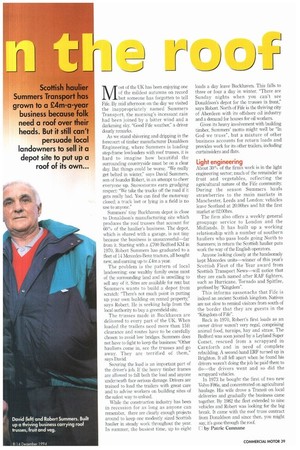Scottish haulie Summers Transport ha grown to a Urn-a-yea business
Page 41

If you've noticed an error in this article please click here to report it so we can fix it.
because folk need a roof over their heads. But it still can't persuade local landowners to sell it a depot site to put up a roof of its own...
Most of the UK has been enjoying one of the mildest autumns on record but someone has forgotten to tell Fife. By mid afternoon on the day we visited the inappropriately named Summers Transport, the morning's incessant rain had been joined by a bitter wind and a darkening sky "Good Fife weather," a driver dourly remarks.
As we stand shivering and dripping in the forecourt of timber manufacturer Donaldson Engineering, where Summers is loading step-frame lowloaders with roof trusses, it is hard to imagine how beautiful the surrounding countryside must be on a clear day. But things could be worse. "We really get belted in winter," says David Summers, son of founder Robert, in an attempt to cheer everyone up. Snowstorms earn grudging respect: "We take the n-ucks off the road if it gets really had. You can find the motorway closed; a truck lost or lying in a field is no use to anyone."
Summers' tiny Buckhaven depot is close to Donaldson's manufacturing site which produces the roof trusses that account for 60% of the haulier's business. The depot, which is shared with a garage, is not tiny because the business is unsuccessful—far from it. Starting with a I:700 Bedford KM in 1970, Robert Summers has graduated to a fleet of 14 Mercedes-Benz tractors, all bought new, and earning up to £4m a year.
The problem is the pattern of local landowning: one wealthy family owns most of the surrounding land and is unwilling to sell any of it. Sites are available for rent but Summers wants to build a depot from scratch: "There's not much point in putting up your own building on rented property," says Robert. He is seeking help from the local authority to buy a greenfield site.
The trusses made in Buckhaven are delivered to every part of the UK. When loaded the trailers need more than 15ft clearance and routes have to be carefully chosen to avoid low bridges. Summers does not have to fight to keep the business: "Other hauliers come in, see the trusses and go away. They are terrified of them," says David.
Securing the load is an important part of the driver's job. If the heavy timber frames are allowed to fall both the load and anyone underneath face serious damage. Drivers are trained to load the trailers with great care and to advise workers on building sites of the safest way to unload.
While the construction industry has been in recession for as long as anyone can remember, there are clearly enough projects around to keep one modestly sized Scottish haulier in steady work throughout the year. In summer, the busiest time, up to eight loads a day leave Buckhaven. This falls to three or four a day in winter. "There are Sunday nights when you can't see Donaldson's depot for the trusses in front," says Robert. North of Fife is the thriving city of Aberdeen with its offshore oil industry and a demand for houses for oil workers.
Given its heavy involvement with building timber, Summers' motto might well be "In God we truss", but a mixture of other business accounts for return loads and provides work for its other trailers, including curtainsiders and flats.
Light engineering
About 30% of the firms work is in the light engineering sector; much of the remainder is fruit and vegetables, reflecting the agricultural nature of the Fife community During the season Summers hauls strawberries to the main markets in Manchester, Leeds and London: vehicles leave Scotland at 20.00hrs and hit the first market at 02.00hrs.
The firm also offers a weekly general groupage service to London and the Midlands. It has built up a working relationship with a number of southern hauliers who pass loads going North to Summers; in return the Scottish haulier puts work the way of the English operators.
Anyone looking closely at the handsomely kept Mercedes units—winner of this year's Scottish Fleet of the Year award from Scottish Transport News—will notice that they are each named after RAF fighters, such as Hurricane, Tornado and Spitfire, prefixed by "Kingdom".
This informs sassenachs that Fife is indeed an ancient Scottish kingdom. Natives are not slow to remind visitors from south of the border that they are guests in the "Kingdom of Fife".
Back in 1970, Robert's first loads as an owner driver weren't very regal, comprising animal food, turnips, hay and straw. The Bedford was soon joined by a Leyland Super Comet, rescued from a scrapyard in Carnforth and in need of complete rebuilding. A second-hand ERF turned up in Brighton. It all fell apart when he found his drivers weren't doing the job he paid them to do—the drivers went and so did the scrapyard vehicles.
In 1973 he bought the first of two new Volvo F86s, and concentrated on agricultural haulage. His wife drove a Transit on local deliveries and gradually the business came together. By 1982 the fleet extended to nine vehicles and Robert was looking for the big break. It came with the roof truss contract from Donaldson and since then, you might say, it's gone through the roof.
1-] by Patric Cunnane
























































































